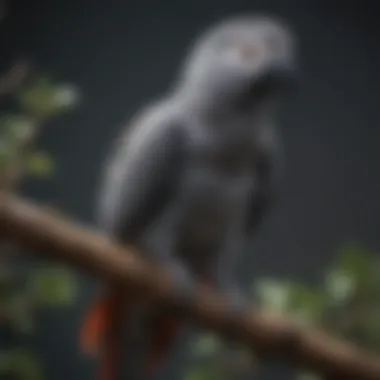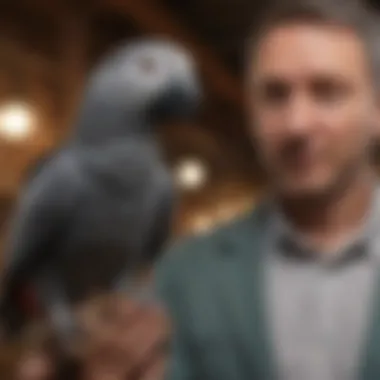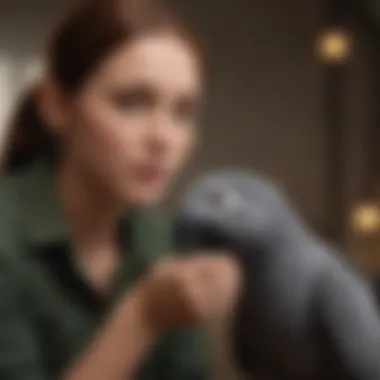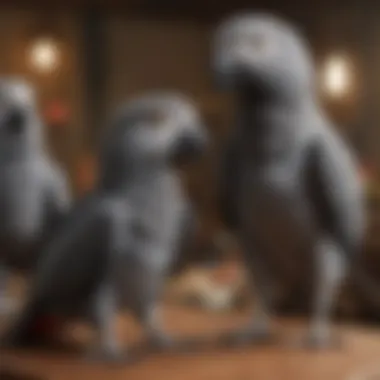Finding African Grey Parrots Near You: A Comprehensive Guide


Intro
When searching for an African Grey parrot, it is essential to understand not only where to find them but also how to meet their needs. This experience can become overwhelming due to the myriad of options and requirements. Engaging responsibly with avian care begins before you even acquire your feathered friend. A deeper understanding of their nature as intelligent creatures enhances the journey. This guide provides practical dna straightforward information to assist you in locating reputable sources, supporting organizations, and online platforms.
Avian Care Basics
Having a strong grasp of avian care principles is foundational for new owners. It prepares you for the long-lasting commitment involved in nurturing African Grey parrots.
Importance of Proper Nutrition
Providing balanced nutrition is crucial to the overall health of African Grey parrots. These birds require a varied diet that incorporates premium pellets, fresh fruits, vegetables, and occasional nuts. Each food item has specific nutritional value which supports their demanding intellectual functions. Knowing appropriate portions and types of food keeps your parrot healthy and robust.
Understanding Bird Species and Their Needs
African Grey parrots are known for their remarkable intelligence. They require stimulating environments to thrive. It is vital to research their specific behaviors, social structures, and individual quirks. Each parrot may show different preferences and behaviors, so adapt accordingly. Secure plenty of interactive toys to provide mental stimulation and engage the bird in positive activities.
Basics of Birds Habitat Setup
Setting up a proper habitat involves more than just a cage. Ensuring adequate space, perches, and toys for physical activity are fundamental. The areas should facilitate a comfortable environment as well as reflect natural elements. Place clean bedding and change water frequently; this reduces potential health risks. Additionally, maintain moderate temperature and humidity levels to ensure comfort.
Grooming and Hygiene Tips
Maintaining proper hygiene comes with responsibilities. Regular grooming includes nail trimming, beak care, and feathers cleaning. Use gentle tools and introduce these practices slowly to the bird. Establish a routine which helps your bird adapt and may also strengthen the bond between owner and parrot. Overall hygiene should extend to their living space; a clean environment results in healthier birds.
Interacting with Your Pet Bird
Proper interaction during those essential bonding moments will significantly affect both the bird's wellbeing and the owner's enjoyment. Continuous engagement with your parrot supports social abilities and enriches lives.
Building Trust and Connection
Establishing a trusted relationship is paramount. This involves patience and diligence over time. Begin by allowing your bird to observe you from a distance, and gradually enter their personal space. Use gentle words while offering treats; repetition fosters trust.
Training Techniques and Tips
Training techniques for African Grey parrots are equally adaptive to their nature. Seek out positive reinforcement strategies which can lead to better behavior and successful learning. Commands can include simple phrases, as birds imitate sounds astonishingly well. Keeping training sessions brief keeps the bird engaged without overwhelming it.
Fun Activities for Bird Owners and Their Birds
Not all activities with your bird need formal training. Playtime and simple interaction aid tranqility. Activities can include providing bells or swings for enjoyment. Observing your bird's reactions will help understand their preferences and passions in play, making the interaction naturally engaging for both.
Recognizing Bird Cues and Behaviors
Understanding your African Grey relies on reading their body language. Subtle signals like feather fluffing or a tilted head denote comfort or curiosity, while feathers ruffling and pacing indicate stress. Learning such cues enhances communication between the bird and the owner, leading to a harmonious environment.
Understanding African Grey Parrots
Understanding African Grey parrots is essential for anyone considering bringing one into their lives. These birds are not only companionable but also exceptionally intelligent and require special attention and care. Familiarizing oneself with their characteristics, behaviors, and health considerations sets the foundation for a harmonious relationship between humans and these avian companions.
Characteristics and Behavior
African Grey parrots, particularly the Congo and Timneh varieties, exhibit notable characteristics. Their brilliant gray plumage, accented by striking red tails and black beaks, captivates many bird enthusiasts. Yet, what is often more captivating is their behavior. They thrive on mental stimulation and social engagement. Behavioral variations can emerge based on genetics, environment, and interaction with humans.
Key behavioral traits include:
- Vocalization: They are known for their ability to mimic human speech and other sounds, often displaying a vast repertoire of words. This ability highlights their intelligence but can also lead to challenges if loud discussing becomes bothersome in the household.
- Curiosity: These birds are inherently inquisitive, expressing a desire to explore their surroundings. They benefit significantly from enrichment activities that challenge their clever minds.
- Social Structure: African Greys are social creatures needing daily interaction, not just physical but emotional as well. Lack of socialization can lead to behavioral issues such as feather plucking.
Being prepared to meet these needs varies widely for prospective owners. Understanding behaviors helps evaluate one's capacity to support an African Grey's rich social and emotional needs.


Life Expectancy and Health
Life expectancy for an African Grey parrot typically ranges from 40 to 60 years, making them a long-term commitment, sometimes even outlasting their owners. Consequently, understanding the health aspect is crucial for anyone interested in welcoming one into their home.
Regular health check-ups are vital. The following points merit attention:
- Diet: A well-balanced diet focusing on pellets, fruits, and vegetables is significant for maintaining their health.
- Exercise: Adequate space for flight and activity is crucial to prevent obesity and other health issues. Mental stimulation is equally important, fostering wellness both physically and mentally.
- Common Health Concerns: African Grey parrots may suffer from conditions such as psittacine beak and feather disease, which requires close observation. Owners should be aware of changes in behavior and physical symptoms like changes in feathers or appetite.
Education on potential health issues is key, as proactive measures can greatly enhance a parrot's quality of life and longevity.
This understanding is vital not just for the parrot’s well-being but also aligns with the owners' responsibilities.
The Importance of Locating a Reputable Source
When seeking an African Grey parrot, knowledge of where and how to find one cannot be overstated. This journey requires an understanding of the distinction between credible sources and those that may not prioritize the health and wellbeing of the birds.
Locating a reputable source holds significance for multiple reasons. First, reputable breeders or rescues often prioritize the health of their birds. They ensure the birds are raised in good conditions, alleviating the risk of diseases or behavioral issues stemming from neglect or poor quality of existence. This alone can save future owners from unneeded heartaches and financial burdens stemming from potential health complications down the line.
Additionally, ethical practices are often associated with trustworthy sources. Responsible breeders engage in ethical mating practices to avoid genetic disorders, whereas reputable rescues prioritize finding loving homes for neglected or abandoned birds. This commitment to accountability nurtures a balance between the supply and need for these birds within the community.
In essence, finding a reliable source is vital for ensuring not only the physical health of the parrot but also the overall emotional stability of both the bird and its future owner. Therefore, recognizing such sources can significantly enrich the quality of a person's experience as a bird parent.
Distinguishing Breeders from Pet Stores
One must consider the key differences between breeders and pet stores when searching for an African Grey parrot. Breeders specialize in the care and breeding of specific parrot species, resulting in a focus on genetic health and temperament. Generally, breeders offer better information about the lineage of the birds, and they usually can provide guidance on proper care and training. They are likely passionate about the birds and can share valuable insights and experiences.
On the contrary, pet stores tend to sell a variety of animal types and may not have specialized knowledge about each bird. Many stores lack proper breeding practices, leading to uncertain activities within their supply chain. Birds in a pet store might have come from different sources which result in inconsistent health conditions, disproportionately increasing the chance of inheriting diseases.
When considering rounding up your potential breeders to evaluate, ensuring they have precise experience with African Grey parrots might grant peace of mind for your upcoming commitment. Questions of socialization, previous health inspections, and even compatibility with children can aid in such discussions.
The Role of Bird Rescues and Sanctuaries
Bird rescues and sanctuaries serve a crucial function in wildlife conservation and the welfare of birds, specifically in rehoming parrots that need urgent attention. These organizations dedicate their efforts to rescuing neglected, abandoned, or abused African Grey parrots, providing care until they find lifelong homes.
Supporting a rescue means contributing to a larger mission of advocating for humane treatment of all animals. By adopting from a sanctuary or rescue, new owners often inherit a bird who is already trained or has received a certain level of socialization. Adopting along this route can indeed be a great way to welcome a bird into your home with lesser strain on prior adjustments.
Furthermore, rescues frequently provide educational resources, encouraging responsible ownership and awareness of potential obligations for parrot care. Some affiliated organizations normally assess behavioral traits that can help determine the bird’s fit for an owner’s lifestyle. Questions about how often you’ll be home, your experience with pets, and any other birds you own can address needs. Ensuring you are matched with a suitable companion vastly enriches the outcome for both parties.
Remember, adopting is not only an act of kindness but also a commitment to a life form in need. Researchers show this recognition shall assist in developing a more enriching environment for generations ahead.
Searching for African Grey Parrots Near You
Finding African Grey parrots near you is crucial for potential owners looking to bring these intelligent and social birds into their lives. Various avenues for obtaining an African Grey exist, and it is important to assess all available resources. This process involves understanding the landscape of breeders, sanctuaries, and online platforms.
Accessing these channels ensures that future owners can find the right match while adhering to ethical practices. Without knowledge of where to look, finding a healthy, well-cared-for parrot can become a daunting task. Additionally, local sourcing allows for better observation of the bird's living conditions, which is significant.
Online Resources and Directories
There are many dedicated online resources that focus on connecting potential parrot owners with reputable sources. Websites like wikipedia.com provide basic information while directories specifically for bird sales, such as bird breeder registries, can be quite informative. These directories are not only user friendly but can give you contact details necessary for inquiries. Make sure to look into multiple databases for the best chance to find available African Greys.
Furthermore, you can find a stronger community presence in various forums. Listed platforms such as reddit.com and local Facebook groups often contain discussions about where to find or rescue parrots. Sometimes, prior owners will post add options, maeing your hunt more successful.
Local Bird Expos and Shows
Attending local bird expos and shows is another productive way to search for African Grey parrots. These events often bring together breeders, rescue organizations, and enthusiasts. Engage with attendees to network and gain inside knowledge from passionate people who can guide your quest to find a parrot. Shows also provide invaluable opportunity, allowing you to observe birds firsthand, negotiate, and form potential relationships.
Since avian expos generally aim to educate the public about responsible bird care, it makes it easier to find reputable sellers. Furthermore, attendance at many expos is free, making it relatively easy to see a wide assortment of birds under one roof.
Community Recommendations


Community recommendations cannot be overstated. Seeking out advice from fellow bird enthusiasts can yield helpful results. A dedicated group might steer you towards lesser-known breeders who adhere to gentle practices, ensuring healthy and well-socialized birds. Local avian veterinarians can provide advice and will often know of reputable breeders or organizations.
Additionally, mustn't ignore the influence of word of mouth. The beauty is in connections formed among fellow pet owners. These relationships can lead you to reliable sources previously unknown. Consider posting in social media platforms, asking for recommendations as this not only increases engagement but enriches the whole search process.
If extensive quality searching combined with community connections, your chance to find a healthy African Grey parrot will notably increase. Aim for first-hand information.
Evaluating a Potential Acquisition
This section is crucial for any potential owner of an African Grey parrot. Given their intelligence and complex needs, evaluating a potential acquisition involves more than just selecting a bird based on appearance or price. Understanding the source, the bird's background, and future care considerations are all paramount.
Proper evaluation can prevent impulsive decisions, ensuring that you are ready for the lifelong commitment that parrot ownership entails. Considering important factors will foster a beneficial environment for both the bird and the owner.
Questions to Ask Breeders or Rescues
When approaching a breeder or a rescue organization, several focused questions can help you gauge whether the source is reputable and if the bird’s needs have been met. Some examples include:
- What is the bird's age and history? Understanding the background of the bird is important for future care.
- Can you provide health records? This is essential for knowing any previous health issues.
- What type of socialization has the bird undergone? It gives insight into how the bird has been raised.
- What dietary needs have been met thus far? Knowledge about the bird’s current diet will help replicate it in your home.
- What is your policy on returns? Unexpected situations may arise, and understanding this policy is essential.
Assessing Health and Temperament
Health assessment is pivotal when considering an African Grey parrot. Often, a quick visual check can provide some insight, but it is not sufficient on its own. Pay close attention to:
- Feathers: Look for any missing or damaged feathers which may indicate underlying issues.
- Eyes and Nose: Clear eyes and nostrils are signs of good health.
- Behavior: Observe its interaction with individuals. A friendly demeanor can indicate a positive temperament.
It is beneficial to ask if the bird has undergone any recent veterinary assessments.
Understanding Socialization Needs
Ensuring an African Grey parrot feels comfortable in a new home requires acknowledging their socialization requirements. These birds thrive on interaction and intellectual engagement. A few points to consider include:
- Routine Interaction: How often was the bird handled? A bird used to regular interaction may adapt better than one that has not.
- Exposure to Different Environments: Birds accustomed to varied settings tend to be more adaptable.
- Integration Into Family Activities: understanding the previous living circumstances helps set realistic expectations for social interaction.
In sum, these evaluations establish a firm foundation for welcoming an African Grey parrot into your home. They assure that both you and the bird embark on a healthy and fulfilling companionable journey.
Important: Take your time in this evaluation process; rushing could lead to regrettable choices.
Preparing for Your African Grey Parrot
Preparing for the arrival of an African Grey parrot requires careful consideration and planning. These birds are notable for their high intelligence and strong social needs. It is essential to understand that owning an African Grey is not merely about ownership, but about forming a bond with a sentient being that needs your attention and care. This section will delve into the vital preparatory steps required to ensure both the owner and parrot thrive together.
Necessary Supplies for First-Time Owners
When bringing home an African Grey, having the right supplies sets the foundation for a successful relationship. Some essential items to consider include:
- Cage: Choose a spacious cage that allows freedom of movement and exercise. Look for dimensions that accommodate flying and include perches of various sizes.
- Toys: Mental stimulation is critical for these intelligence-driven birds. Interactive toys, shreddable items, and puzzle playthings are highly recommended.
- Bedding: Safe materials for substrate prevent accidental ingestion. Paper, wood-based options, and recyclable materials work well.
- Food & Water Bowls: Sturdy, non-toxic bowls are required to present fresh food and water daily.
- Pellets and Fresh Food: A quality diet includes high-nutritional pellets, fresh fruits, vegetables, and occasional seeds. This balanced diet helps in maintaining optimal health and energy levels.
The right supplies align with the emotional and physical needs of the bird, making them imperative for first-time owners.
Setting Up a Comfortable Habitat
Creating a habitat that mirrors the African Grey's natural environment offers comfort and security. Select a location where the bird can engage with family members but still feel safe. Here are some fundamental aspects:
- Noise Levels: Avoid noisy places, like near TVs or loud appliances. The environment should be relatively calm.
- Light and Ventilation: Ensure the area has sufficient indirect light. Proper ventilation is also crucial; however, avoid drafts.
- Arrangement: Ensure the cage accommodates multiple perches at different levels. Birds love to climb and explore.
- Social Interaction: Spend time throughout the day with your any Grey crating bonds and reducing anxiety. Place the cage where it can interact with family members.
A well-designed habitat contributes to the overall well-being of the parrot.
Understanding Dietary Requirements
An understanding of dietary requirements is fundamental to a successful ownership experience. Here are a few important notes about their feeding needs:


- Main Diet: A good base should be quality pellets. Avoid seed-only diets, as these lack essential nutrients needed.
- Fruits and Vegetables: Offer a variety of fresh produce daily. Options can include apples, carrots, spinach, and berries.
- Supplementation: Supplements may be needed for calcium and vitamins, especially if recommend by a veterinarian.
- Hydration: Fresh, clean water must always be accessible.
It’s vital to avoid harmful foods, like avocado, chocolate, and caffeine. These can cause significant health risks.
Adequate knowledge of diet promotes longevity and health for an African Grey parrot, thereby maximizing the joy of bird ownership. A committed, informed owner is one who nurtures a thriving, engaging relationship with their pet.
Long-Term Care and Commitment
Having an African Grey parrot is not a one-time decision. It involves continuous care and a serious commitment over many years. Understanding what this includes is crucial for potential owners. African Grey parrots can live anywhere from 40 to 60 years. Therefore, your decision will likely influence the many years of their life.
Caring for an African Grey requires dedication, especially in the aspects of daily care routines, mental stimulation, and regular health checks. This committed approach not only contributes to the well-being of the bird but also enhances the bond between owner and pet.
Daily Care Routines
Daily care is foundational for the health of your African Grey. They require structured routines to feel secure in their environment. As high-intelligent creatures, they thrive on other emotional and social dependencies of their caretakers.
Here is a typical daily care schedule:
- Morning Routine: Fresh food and clean water should be provided first thing in the morning. It's also essential to interact with your parrot upon waking to start the day positively.
- Around Noon: Spend time with your bird, using this opportunity for any training. Mental engagement is significant.
- Evening: Dim the lights and begin winding down. Offering a calming activity, like gentle speaking or quiet music, helps transition to rest nightly.
By sticking to this routine, you establish stability and provide structure that immensely benefits your parrot’s psychological needs.
Mental Stimulation and Social Interaction
Mental stimulation is vital in keeping an African Grey healthy and happy. These birds are intelligent and require frequent engagement. Mind-riddling games and activities keep their minds sharp.
Consider activities such as:
- Interactive Toys: Use various toys that encourage problem-solving like puzzle toys or foraging devices.
- Training Sessions: Short bursts of training sessions reinforce learning and understanding, plus build confidence in the bird.
- Social Interaction: African Grey parrots are highly social and should engage daily with their owners. This can include coming out of the cage, getting pets, or simply hanging out together. Boredom can lead to behavioral issues; thus finding different ways to interact is crucial.
Regular Health Check-ups and Vet Visits
Just as important as proper feeding and environmental structure, regular health check-ups cannot be overstated. Keeping a dedicated and routine appointment schedule with an avian vet ensures your African Grey stays healthy.
Key aspects of this are:
- Yearly check-ups: These should include thorough exams, assessing weight, plumage, and behavioral style.
- Emergency visits: Understand signs that indicate your parrot might be unwell such as changes in eating habits or unusual behavior.
Cats do not require the same attention as birds; the care must be specific and attentive to the African Grey’s needs. Ensuring that an avian vet can offer insights solely pertaining to parrots raises your chances of maximizing their well-being.
Each component of care improves not just the overall health of your African Grey but fortifies a lasting relationship built on trust. It's about respect through informed decisions and responsible actions in becoming a devoted bird parent.
Ethics of Bird Ownership
The decision to keep an African Grey parrot is not one to be taken lightly. It carries several ethical implications. Understanding the responsibilities associated with bird ownership is crucial. Owners must prioritize the well-being of the pets above all else. A practice of responsible ownership ensures not just happiness for the pet but also fosters a better bond between bird and owner.
Conservation and Responsible Ownership
Owning birds, especially a species like the African Grey, impacts wild populations. Overharvesting and habitat loss threaten their existence. To uphold ethical ownership, potential owners should consider adopting, rather than buying, from pet stores or breeders.
- Adoption Options: Rescues often have African Greys needing homes. Bringing an adopted bird provides it a second chance and reduces market demand for wild-caught birds.
- Know Your Bird’s Needs: African Grey parrots require stimulation and social interaction. Providing enrichment through toys and daily interaction is a duty inherent to ownership.
Making conscious choices about ownership leads to awareness and challenges against unethical practices in aviculture.
Understanding Legislation and Regulations
Legal frameworks regarding bird ownership exist for a reason. There are rules regarding breeding and selling birds to ensure their safety and ethical treatment. Being informed of pertinent laws is an important facet of ethical ownership.
In many regions, restrictions exist on owning certain species of parrots.
- Local Regulations: Always check your local wildlife laws. Failing to do so can lead to legal complications and endanger your bird.
- Breeder Accountability: Responsible breeders comply with regulations to ensure they breed healthy birds in humane conditions. Finding a compliant breeder affects ethical considerations significantly.
This is crucial not only from a legal standpoint but for the sustainability of African Grey populations as well.
Owning an African Grey should be rooted in a genuine commitment to their welfare, health, and dignity as living beings. Balancing personal desires with these ethical considerations is essential in fostering a healthy avian community.















